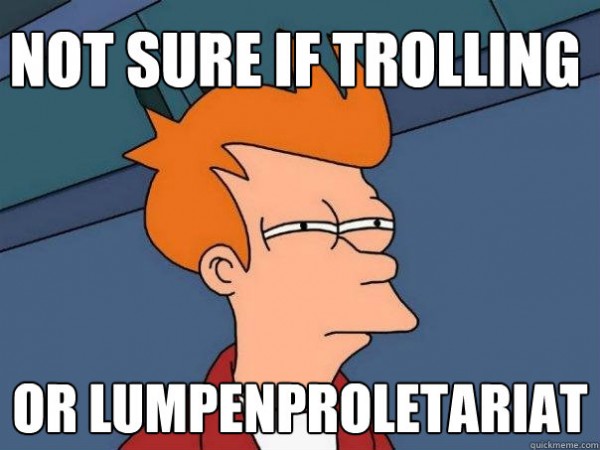 “So, I figured out what happened to Jane,” the dungeon manager said.
“So, I figured out what happened to Jane,” the dungeon manager said.
“Oh?”
“My friend ran into her the other day. She’s a cop now.”
“I guess that makes some kind of sense ,” I said.
“Mmhhmm. She can beat-up people legally now.”
That’s the punchline. Do you get it? Let me take all the humor out of it by explaining: in most U.S. jurisdictions, professional dommes are criminalized under prostitution laws 1, and police can de facto brutalize whoever they want, especially if that person is Black like the dungeon manager is. Her joke isn’t funny-ha-ha; it’s ironic. It’s also funny-strange: why would a fascist like Jane spend years working as a petty criminal?
I’m going to hazard a guess and say that Jane bought the popular line about pro-dommes. It seems we’ve confused dressing up in Slutty Cop Halloween costumes and consensually slapping men’s scrotums with having real power. And when I say “we,” I don’t just mean Jane and other BDSM pros. I mean everyone. I mean, look at this recent example of how the media covers professional domination:
“The new group Dommes for Bernie placed an ad on Manhattan’s Backpage.com classifieds on Friday, calling for Wall Street workers to step up for punishment worthy of the Bernie Sanders presidential platform,” Mary Emily O’Hara writes at The Daily Dot. Both O’Hara and the DfB present ad copy as testament to a reality in which pro-dommes really do discipline our clients. “We think it’s poetic justice to dominate men who benefit from capitalism, and then donate their tributes to a candidate who stands up for those most harmed by it,” O’Hara quotes one of the dommes as saying. I fail to see the poetry or the justice of a man quite happily paying a woman for a highly gendered form of labor, and the woman taking her money and doing with it as she sees fit—in this case, donating to a center-left candidate for the presidency of a neocolonial empire that stands on stolen land.
But then, I also don’t see how a half dozen or so fin-dommes have transformed “fuck you, pay me” dirty talk into a semi-coherent rhetoric of wealth redistribution on certain strains of social justice Twitter. It seems obvious to me that gamely paying $20 in Amazon gift cards for a carefully calibrated performance of sexualized bitchiness is not full communism. Where did everyone else get it twisted?
 In the dungeon, I assume. Pretending the power dynamics of our work are the exact opposite of their economic reality is a key aspect of the work itself. It is an illusion we’re paid to maintain. Of course, we are also paid for sexual labor, and for a specific sexualized skill set that requires expensive equipment. But the affective labor is what holds it all together, and it is truly singular. In no other profession is a worker employed directly by a client while holding no institutional or systemic power over that employer (the way, for example, a therapist does), while pretending to that power as a key aspect of her job.
In the dungeon, I assume. Pretending the power dynamics of our work are the exact opposite of their economic reality is a key aspect of the work itself. It is an illusion we’re paid to maintain. Of course, we are also paid for sexual labor, and for a specific sexualized skill set that requires expensive equipment. But the affective labor is what holds it all together, and it is truly singular. In no other profession is a worker employed directly by a client while holding no institutional or systemic power over that employer (the way, for example, a therapist does), while pretending to that power as a key aspect of her job.
This might be harmless if pro-dommes were of the same class as our clients, but we aren’t workers in the way that they’re workers. Most of our clients are middle-class, upper-middle class, and sometimes rich—or, in Marxist terms, petit bourgeoisie and bourgeoisie. Even the working-class proletariat who saves up to see us is not a lumpenprole: a member of the criminal black market, like we are. These clients have access not just to greater material wealth but to basic labor rights. Meanwhile, at any moment Jane and her fellow cops might choose, we pro-dommes could lose our freedom, our children, our housing and healthcare, our education and other work—even this work.
Being a member of the lumpenproletariat whose job is to pretend otherwise has mingled with several other phenomena— influencing and being influenced by, in turn, lateral whorephobia, the prevalence of hobbyist sex workers, and ‘Domism’—to create a public discussion around pro-domming that is a funhouse mirror of reality. Top it off with the conflation of materially disparate forms of fetish work (virtual and in-person) under the same label, and this discourse becomes a key part of a convoluted political economy—used here in its sociological sense to describe not just the state regulations of our work but the social phenomena that affect the regulations and the work itself. Mapping out all of this would require a monograph, but the end-point is this: if we continue to play the same role outside the dungeon as we do within it, we will remain alienated from our basic labor rights as well as our labor. We have to separate our in-scene personas from our public conversations about work.
There are ways to do this without compromising business or even dampening political theater. This tweet, for example, takes the “punishment” language out of doing sex work for political donations. It doesn’t erase the consent of the submissive or present our work as a moral reckoning, and it also doesn’t break the illusion. Then there’s the telling-it-like-it-is approach to discussing work and consent, which goes well with brands built around emotional authenticity. Both of these women (in-person workers, I’d like to note) are interacting indirectly with their followers, who are presumably clients and potential clients. Inevitably in such a space you will have some tweets like this, which I will charitably interpret as being in-character. As this tweet demonstrates, refusing to call work what it is is a weak excuse. Performing for clients is the nature of Twitter, after all. It is not the nature of mainstream press interviews.

Reporters are not our clients, and mainstream readership rarely consists of clients, either. I’ve heard of exactly one worker who ever got clients from press. There is, therefore, zero legitimate reason to do an interview as Miss Andry, Professional Destroyer of the Bourgeoisie. Because when we insist that we are not just empowered but powerful, that clients aren’t our employers but our slaves, that we are not like those prostitutes, we enable journalists to elide reporting on our actual working conditions as prostitutes. When O’Hara compares pro-dommes with brothel workers without mentioning the legal status of the former, she misses out on the crucial fact that we are criminalized (something she still may or may not be aware of.) It is our job as advocates to explain otherwise, even if that means using pseudonyms or speaking anonymously.
Here’s the overlooked angle on Dommes for Bernie and Hookers for Hillary: in the criminal sense of the term, pro-dommes fit the definition of “prostitute” more aptly than Nevada brothel workers do. Brothel workers remain prostitutes in the colloquial sense, due to stigma, and they operate in an oppressive legal framework which emerged from the criminalization that we still endure. Yet dommes act as if we were better and better-off than brothel workers. We spend an obscene amount of energy trying to distance ourselves from escorts, parlor workers, and other full-service providers, many of whom also do BDSM, and we hurt ourselves in the process. With a few notable exceptions like Terri-Jean Bedford, we are cut off from the movement.
Other sex workers agitate for their rights, and we claim not to need those rights. They form social and professional networks and we isolate from their organizations. They establish health centers and we ignore our need for STI testing as if needle play were not a higher-risk activity than many forms of sex. They organize know-your-rights trainings, and they certainly don’t miss our holier-than-thou presence when we fail to show.
We’re the ones who miss out on community, on services, and on knowledge that can protect us. We’ve done this to ourselves because it’s easier than fighting. We are, to borrow from Charlotte Shane, high off our own non-hooker fumes, enamored of our in-session personas and giving up the ghost of socioeconomic reality. Our political economy is peculiar, but it’s not so bamboozling that we can’t tell which way is up. It’s time to stop fooling ourselves. Sex workers of the world, unite; you have nothing to lose but the delusion that it’s only your client wearing the chains.
1. Various acts that pro-dommes perform are criminalized, from impact play to full nudity to strap-on anal penetration. Not every pro-domme performs these acts, and nothing should be assumed about the criminal status of any individual mentioned in this article— except for Jane, because ACAB, duh. ↩

I disagree with your last two chapters. But also I am sitting in germany.
BDSM workers identify mostly as sexworkers and many of us are also organized in sex worker right groups and engage in activism, without making differences to “other” sexwork. We identify as whores as well.
This piece only applies to the particular political economics of U.S. pro-domming, since the whole concept of political economy is based on how state regulation influences economics, and I can’t speak to the state regulations in Germany. It’s really interesting hearing this perspective, though. It makes me reconsider how much of our shitty U.S. discourse is really based on getting caught up in the affective labor of pro-domming and how much of it is a tactic for distancing ourselves from more heavily criminalized forms of sexual labor. If both pro-domming and escorting were legal, for example, would we be so invested in distancing ourselves from escorts? Probably not!
Ah damned! I didn´t get a notification on your reply and now 9 months passed before I see your comment!
The whore-archy is well and alive in germany as well (sadly), because many sexworkers do not identify as sexworkers, or at least not as prostitutes. Most pro dommes do, but tantra people are very busy to seperate them from sex work. The new law is actually including everyone performing sexually as sexworker, as long as the client is in the room and engaged in some activity as well. Intercourse is not necessary. Excluded are cam workers, porn performers and strippers. Included are tantric practitioners.
I frequently discuss things with US based sexworkers as well, and am also astonished how far pro-dommes set themselves aside from sexworkers in the states. IMHO this is ridiculous. But the fact that different forms of sexual labor are differently criminalized brings sense into that.
Prime example of divide et impera!
Great article, especially your conclusions about how distancing from the sex worker community robs prodoms of resources that they “don’t know that they need.”
It seems like a rite of passage for many prodoms is to go through a phase where we “drink our own koolaid” or “read our own press releases” and believe the rhetoric.
I was waiting for this article for a long time, thankyou for writing it.
Finally telling it like it is. Several times when trying to discuss actual issues with other dominas as simple as time management or burnout I am flippantly shunned by their queen persona that denies reality. Example: have you ever dealt with burnout since you have been doing this for several years?
” no I love beating men with sticks I get to beat men sticks”, Marilyn monroe voice and all.
Okay, sorry you can’t have a real fruitful conversation because you actually believe your own bullshit.
Look at the lives of fellow dommes, the gritty reality, the arrests, seizures of property and lets have a real conversation. Look at the actual money that you make instead of the money you like to take pictures with on Twitter. Some have even dealt with arrests and still can’t reconcile the fact that they are a queen to so many men but they are just a criminal and sex worker to everyone else.
Reality is Harsh sometimes as a woman in this world and a sex worker but living in a false reality is not only f****** joke it is harmful. Look at our sisters who have committed suicide, and our sisters who suffer.